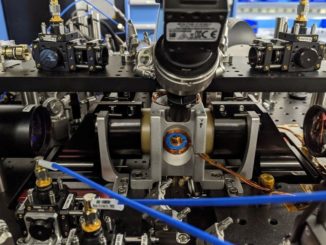
The 2010s provided a range of new quantum hardware makers to evaluate but the 2020s will be focused far more software for broader use of nascent quantum devices. While all hardware makers have their own software interfaces and tooling, the golden grail will be a portable, preferably open operating system of sorts.
Just as with the devices, it’s still too early to tell what the winner’s circle will look like. It could be a decade before there are even clear leaders. But one startup with strong roots at the University of Cambridge thinks it can get an early leg up on the quantum future and has a fresh $20 million in Series A to keep pursuing it.
Riverlane says in the last year alone they’ve managed to sign up 20% of the world’s quantum hardware makers to use its Deltaflow platform. Considering there are only really eight companies that are making quantum systems at any volume this is a small start, albeit for a promising company with strong pedigree in quantum research as well as some of the more backend nuts and bolts (FPGA engineering, application area specialists, etc.).
The funding is Euro-centric and was led by London-based VC, Draper Esprit with add-on from existing investors, including Cambridge Innovation Capital, Amadeus Capital Partners, and not surprisingly, the University of Cambridge, where Riverlane’s CEO and founder, Steve Brierley has spent his research career. Brierley sits on the UK government’s Quantum Computing Expert Group and was as a senior research fellow at the University of Cambridge in quantum. He has a PhD in quantum information from the University of York and has published a number of papers over the course of his career in efficient distributed quantum computing, implementation of efficient quantum circuits, and work toward a generalized variational quantum Eigensolver. In short, he is tackling the problem of a quantum OS in the spirit of deep codesign.
In Riverlane’s view, “The quantum stack is being built upside down. We have qubits and—since we know how to design great languages—many high-level development kits. All of those are based on the circuit model, a CPU directly controlling the QPU…The model disregards what actually goes on in the heterogeneous control stack. It presents quantum computers as black boxes in which only the bottom and the top layers are of relevance. All the middle layers are hidden away.”
The goal is to use all the available resources without venturing into decoherence and, according to Riverlane, this means being able to have all layers of the software stack as integrated and manageable as possible. In the middle of the stack are FPGAs and other devices that push into the quantum machine.
As one might imagine, part of the early team at Riverlane is comprised of FPGA experts, including VP of Engineering, Marco Ghibaudi, who worked on the CERN ATLAS experiments on custom FPGAs for detection and analysis work. He’s joined by a number of other FPGA-oriented researchers as the company builds out its vision for a true “OS” for quantum computing, even though they say that a lot of the functions of the FPGA in current quantum systems will eventually be displaced by custom hardware. The problem now is that an ASIC can’t be designed until there’s a firm software base to build on.
The answer, at least in Riverlane’s view, is comprised in their DeltaFlow-on-ARTIQ product, which the first crack at a quantum OS—one they say will be natively portable across different qubit technologies with the ability to scale to millions of qubits, at least when that era arrives. They are three keys to this emerging OS they define, including the DeltaFlow language, which is used to define a graph of nodes representing the different elements of compute their connections; the DeltaSimulator, which lets users run quantum simulations; and DeltaModels, which can tap into the simulator and use their ARTIQ backend to run DeltaFlow programs. This is just an emulator for now but is open in beta.
Of the new funding, Brierley says, “For a quantum ecosystem to thrive, we urgently need an operating system. An operating system makes quantum computers useful – it allows programs and applications to run on many different machines. Riverlane aims to make our operating system Deltaflow a global standard.
The entire quantum industry has had a perennial chicken and egg problem and companies like Riverlane, despite solid talent and financial foundations, are no exception. Building the end-all software stack for quantum computing presents an even larger uphill battle. With the addition of qubits and added connectivity as well as changing coherence times, the software has to keep pace. Riverlane’s assumption that they can keep pace with rapidly changing qubits and all the companion device-specific hardware and software in a completely portable fashion sounds like a tall order but if all the quantum makers can join in, there may be promise yet. We will continue to watch, as always.





Be the first to comment